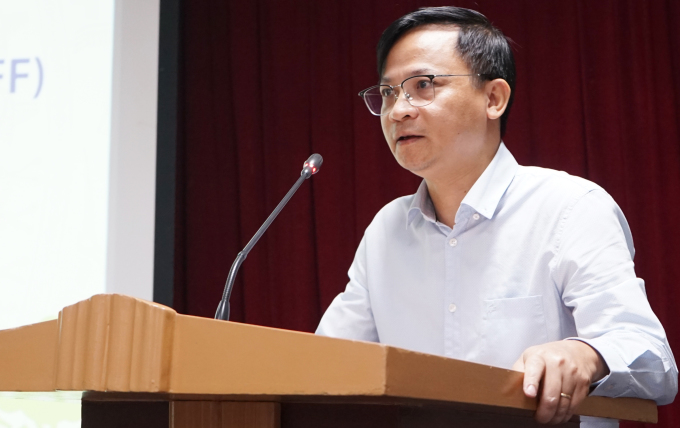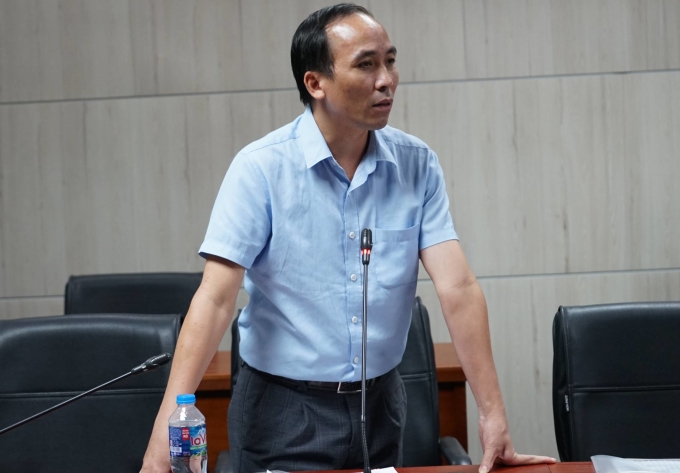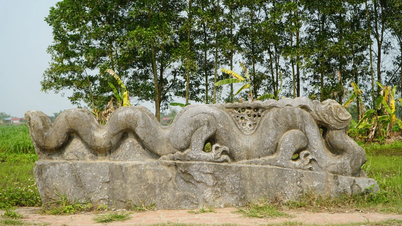Regulations in public asset management and a lack of technology valuation methods are preventing spin-off business models from meeting expectations in promoting the commercialization of technology from universities.
The policy of forming spin-off businesses originating from science and technology organizations promises to make significant contributions to the commercialization of research results. However, "current legal policies still create barriers, preventing supply and demand from meeting but making it impossible to bring research results to market," said Mr. Pham Duc Nghiem, Deputy Director of the Department of Science and Technology Market and Enterprise Development, Ministry of Science and Technology, at a seminar on June 27th.

Mr. Pham Duc Nghiem speaks at the seminar "The role of businesses originating from science and technology organizations (spin-offs) in commercializing research results". Photo: NQ
Citing the reality at the Vietnam Academy of Agriculture , Associate Professor Dr. Nguyen Viet Long, Deputy Director of the Center for Agricultural Innovation, stated that the Academy has developed a project to develop technology-based spin-off enterprises to transfer research and technology for plant and animal breeding. In 2007, they transferred rice varieties worth one million USD. However, the development of spin-off enterprises is currently facing difficulties due to regulations on the management of public assets, especially for projects using state budget funds.
Dr. Vu Tuan Anh, Deputy Head of the Science and Technology Department at Vietnam National University, Hanoi, further clarified that both market-based and expected-application technology valuation methods are impractical, as no organization dares to use them due to legal risks. For example, a state-funded project with 1.5 billion VND might be valued at 1.5 billion VND upon completion. "Does this mean that all the time and effort contributed by the scientists and the leading organization to the project will be worth nothing after a few years of research?" he said, adding that this would distort the market. Vietnam National University rejects the method of valuing projects based on the amount of state funding provided.
Another difficulty, as pointed out by Associate Professor Dr. Le Nguyen Doan Khoi from Can Tho University, is that the Law on the Management and Use of Public Assets stipulates that the right to use and own assets is granted to the organization in charge of carrying out the task. This is a factor that makes it difficult to achieve results. "Lecturers are unwilling to do research, dedicating more time to teaching, not investing in research, and the motivation for research has disappeared," he said. The lack of methods for valuing technology also means that transfer contracts do not accurately reflect the true value.
According to Dr. Le Tat Thanh, Deputy Director of the Institute of Gene Research, Vietnam Academy of Science and Technology, technology transfer and commercialization activities, which were already weak, are now slowing down, and in some places have stopped completely due to fear of legal risks, especially the Law on Public Assets. Transfer activities also face difficulties because transferring technology does not guarantee immediate profit.

Dr. Le Duc Thanh participates in the discussion at the seminar. Photo: Dinh Thang
At the seminar, experts suggested that bottlenecks and policy limitations need to be removed to facilitate the formal transfer of technology.
Dr. Nguyen Trung Dung, CEO of BK Holdings, said that universities can choose suitable models to transfer technology and bring intellectual property to the market. Scientists can contribute by acting as CTOs of technology, helping to transfer results while retaining scientists in leadership roles.
Associate Professor Khoi, on the other hand, suggested that besides simplifying procedures, it is necessary to apply a mechanism for ordering and contracting research products and project funding, and increase the proportion of budget allocated to commercialization activities. Furthermore, policies and mechanisms are needed to link the four stakeholders (farmers, businesses, scientists, and the government), supporting localities or businesses in building and promoting the brands of their strong products.
Mr. Pham Duc Nghiem stated that the Ministry of Science and Technology is coordinating with the Ministry of Finance to supplement and adjust the regulations of Decree 70 guiding the management of assets formed from scientific tasks. "This is the time when new policies are needed to develop the science and technology market, including supporting the formation of spin-off businesses," he said.
Nhu Quynh
Source link

















































































































Comment (0)